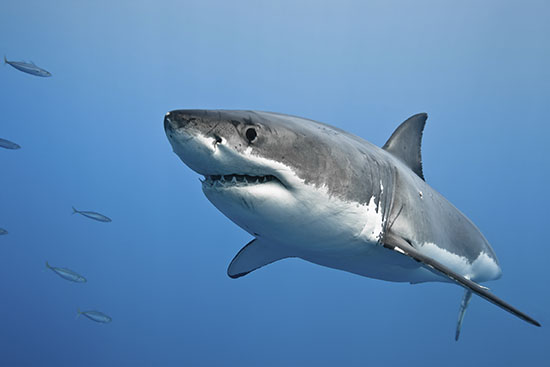Dive Into Shark Week
New England Aquarium offers chance to see species up close

Did you know that a shark can go through 30,000 teeth over the course of its life, or that 70 percent of its brain is devoted to smell? Or that the world’s smallest shark—the dwarf lantern shark—is so tiny you can cradle it in your hands? It’s a great time to amass these and other shark factoids at the New England Aquarium, in preparation for the Discovery Channel’s annual Shark Week. First launched in 1988, the series is now the longest-running—and among the most popular—cable TV programming events in history.
The best place to start is at the Aquarium’s Trust Family Foundation Shark and Ray Touch Tank, located on the first floor. Open since 2011, the exhibit offers visitors the rare opportunity to pet a shark or its close relative, a ray. The tank is designed to resemble a tropical mangrove lagoon and includes bamboo sharks, nurse sharks, epaulette sharks, and a bullhead zebra shark, all of which, happily, are docile enough to pet without fear of losing a hand. The 50-foot-long tank, which holds 25,000 gallons of seawater, has become one of the Aquarium’s most popular attractions. An Aquarium staff member is on hand to answer questions about the animals, how to touch them, and conservation of their habitats.
Be sure not to miss the Great White Shark 3D, a 40-minute IMAX film showing several times a day in a theater adjacent to the Aquarium. The documentary throws you into the open ocean—via New England’s largest movie screen—for a fascinating look at the world’s most feared marine carnivore. Learn the science behind studying great whites and witness their amazing hunting and swimming capabilities. Narrated by Bill Nighy (pirate captain Davy Jones in Pirates of the Caribbean) and filmed off the coasts of South Africa, New Zealand, Mexico, and California, the film challenges a number of misconceptions about great whites. Follow the lives of shark expert Dr. Chris Lowe and adventurers Frederic Buyle and William Winram, who tag great whites by holding their breath and free diving with the sharks.
Before leaving, be sure to be amazed by the Aquarium’s four-story, 200,000-gallon giant ocean tank, which simulates a Caribbean coral reef. A 2013 renovation costing $17.8 million transformed the tank, which is home to more than 1,000 animals representing some 130 species, including barracudas, stingrays, parrotfish, guitarfish, midnight parrotfish, and the undisputed star resident, Myrtle, a 550-pound green sea turtle who arrived at the Aquarium in 1970.
You can see more turtles at the new interactive sea turtle rescue exhibit, which opened July 1. Finally, be sure to check out the 30-foot, lifelike replica of a whale shark—the largest extant member of Chondrichthyes, which despite its fearsome size, is a harmless filter feeder.
The New England Aquarium, located at 1 Central Wharf, next to the Marriott Hotel, is open daily from 9 a.m. to 6 p.m., and until 7 p.m. on Fridays and Saturdays. Great White Shark 3D airs at noon, 2 p.m., and 4 p.m. daily, with 7 p.m. shows on Fridays and Saturdays. For a more detailed daily schedule, visit the Aquarium’s website. Admission to the Aquarium is $26.95 for adults ($9.95 for the Simons IMAX Theatre); $24.95 for seniors 60+ ($7.95 for the Simons IMAX Theatre); $17.95 for children 3–11 ($7.95 for the Simons IMAX Theatre); and free for children under 3 and Aquarium members. Combo tickets are also available and cost $31.95 for adults, $29.95 for college students with a valid ID and seniors 60+, and $22.95 for children 3–11. The lines to purchase tickets can be long; consider buying them online ahead of time.
To get there via public transportation, take a MBTA Green Line trolley to Haymarket, connect to the Orange Line and go two stops to State Street, then connect to the Blue Line and get off at the Aquarium stop. In good weather, it’s a pleasant walk from Haymarket to the Aquarium; walk right on John F. Fitzgerald Surface Road until reaching Atlantic Avenue.
Ashley Mayrianne Jones can be contacted at ashjones@bu.edu.
Comments & Discussion
Boston University moderates comments to facilitate an informed, substantive, civil conversation. Abusive, profane, self-promotional, misleading, incoherent or off-topic comments will be rejected. Moderators are staffed during regular business hours (EST) and can only accept comments written in English. Statistics or facts must include a citation or a link to the citation.